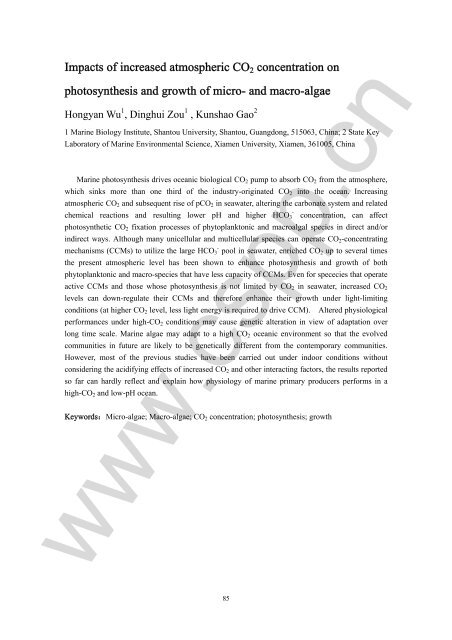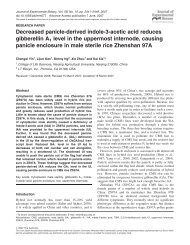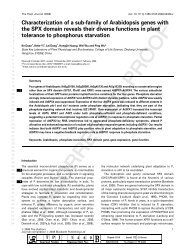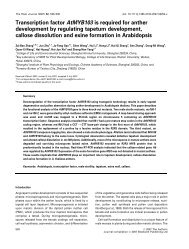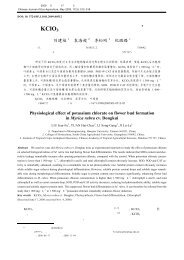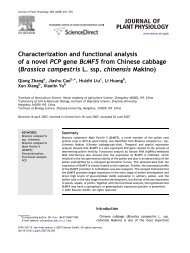Untitled - ä¸å½æ¤ç©ççä¸ååçç©å¦å¦ä¼
Untitled - ä¸å½æ¤ç©ççä¸ååçç©å¦å¦ä¼
Untitled - ä¸å½æ¤ç©ççä¸ååçç©å¦å¦ä¼
You also want an ePaper? Increase the reach of your titles
YUMPU automatically turns print PDFs into web optimized ePapers that Google loves.
Impacts of increased atmospheric CO 2 concentration on<br />
photosynthesis and growth of micro- and macro-algae<br />
Hongyan Wu 1 , Dinghui Zou 1 , Kunshao Gao 2<br />
1 Marine Biology Institute, Shantou University, Shantou, Guangdong, 515063, China; 2 State Key<br />
Laboratory of Marine Environmental Science, Xiamen University, Xiamen, 361005, China<br />
Marine photosynthesis drives oceanic biological CO 2 pump to absorb CO 2 from the atmosphere,<br />
which sinks more than one third of the industry-originated CO 2 into the ocean. Increasing<br />
atmospheric CO 2 and subsequent rise of pCO 2 in seawater, altering the carbonate system and related<br />
-<br />
chemical reactions and resulting lower pH and higher HCO 3 concentration, can affect<br />
photosynthetic CO 2 fixation processes of phytoplanktonic and macroalgal species in direct and/or<br />
indirect ways. Although many unicellular and multicellular species can operate CO 2 -concentrating<br />
mechanisms (CCMs) to utilize the large HCO 3 - pool in seawater, enriched CO 2 up to several times<br />
the present atmospheric level has been shown to enhance photosynthesis and growth of both<br />
phytoplanktonic and macro-species that have less capacity of CCMs. Even for spececies that operate<br />
active CCMs and those whose photosynthesis is not limited by CO 2 in seawater, increased CO 2<br />
levels can down-regulate their CCMs and therefore enhance their growth under light-limiting<br />
conditions (at higher CO 2 level, less light energy is required to drive CCM). Altered physiological<br />
performances under high-CO 2 conditions may cause genetic alteration in view of adaptation over<br />
long time scale. Marine algae may adapt to a high CO 2 oceanic environment so that the evolved<br />
communities in future are likely to be genetically different from the contemporary communities.<br />
However, most of the previous studies have been carried out under indoor conditions without<br />
considering the acidifying effects of increased CO 2 and other interacting factors, the results reported<br />
so far can hardly reflect and explain how physiology of marine primary producers performs in a<br />
high-CO 2 and low-pH ocean.<br />
Keywords:Micro-algae; Macro-algae; CO 2 concentration; photosynthesis; growth<br />
www.cspp.cn<br />
85


